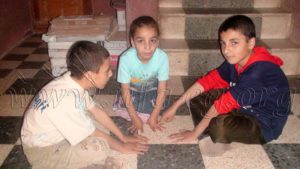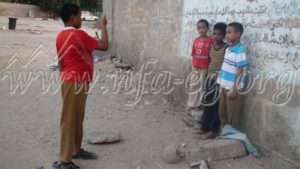Hadi Badi /Eeny, meeny, miny, moe
“Hadi Badi, Koromb, Zabadi, Sidi Mohamed El-Boghdadi, Shalo w hato w kolo Ala di (Eeny Meeny , miny , moo, Cabbages or Yoghurt? Sidi Mohamed El-Boghday, we choose this)”
The sounds of kids playing on the streets or court yards usually include such choosing game. This is more of a chant or song that they use in-order to help them choose which one will play which role in any game. It is not a game in it-self, it is rather an introduction to a following game.
Where one of the children starts chanting such song, and with every verse she puts her hand on each one’s head, until she reaches the end of the song, and whomever’s head is touched comes out of the line. She continues to chant until only one is left in line and that’s the one who gets to play a specific role in the game to follow.
“Hadi Badi, Koromb, Zabadi, Sidi Mohamed El-Boghdadi, Shalo w hato w kolo Ala di (Eeny Meeny , miny , moo, Cabbages or Yoghurt? Sidi Mohamed El-Boghday, we choose this)”
Such choosing game is popular among kids all over Egypt. It is interesting because it is a vivid element of intangible heritage. The lyrics of the game are widely believed to reflect the Sufi impact on Egyptians, for it is said that Sidi Mohamed El-Boghdadi is in fact the head of the Naqshabandi Sufi order who came to Egypt from Iraq in 1914. Seeking his guidance to pick and choose is a common Sufi belief. And in Egyptian popular culture, Boghdadi means coming from Baghdad.



